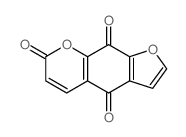482-44-0
| 中文名 | 欧前胡素 |
|---|---|
| 英文名 | imperatorin |
| 中文别名 | 前胡素 |
| 英文别名 |
Pentosalen
Imperatorin Enoxypsoralen MFCD00016881 7H-Furo[3,2-g][1]benzopyran-7-one, 9-[(3-methyl-2-buten-1-yl)oxy]- MARMELOSIN AMMIDIN 9-[(3-Methyl-2-buten-1-yl)oxy]-7H-furo[3,2-g]chromen-7-one Marmelide 8-ISOAMYLEN 9-[(3-Methyl-2-buten-1-yl)oxy]-7H-furo[3,2-g]chromen-7-on EINECS 207-581-1 |
| 描述 | Imperatorin 是一种有效的 NO synthesis 抑制剂,IC50 为 9.2 μmol,也是 BChE 抑制剂,IC50 为 31.4 μmol。Imperatorin 是 TRPV1 的微弱激动剂,EC50 为 12.6±3.2 μM。 |
|---|---|
| 相关类别 | |
| 靶点 |
IC50: 9.2 μmol (NO synthesis), 31.4 μmol (BChE)[1]EC50: 12.6±3.2 μM (TRPV1)[2] |
| 体外研究 | 欧前胡素是属于香豆素类-特别是呋喃香豆素类的植物次生代谢产物。欧前胡素通过α1β2γ2S受体增强GABA诱导的氯离子电流(IGABA)。欧前胡素可使IGABA在100μmol下增加50.5±16.3%,在300μmol下增加109.8±37.7%。在白藜芦醇根中发现的欧前胡素和Phellopterin在体外抑制[3H]地西泮与大鼠脑GABAA受体的苯二氮卓位点的结合,欧前胡素的IC50为12.3μmol,Phellopterin的IC50为400nmol。欧前胡素浓度范围为3.5至14毫摩尔,通过与GABA-T的活性位点不可逆地结合,以时间依赖性和浓度依赖性方式显着且不可逆地抑制GABA-T。角质素是一种可逆的乙酰胆碱酯酶(AChE)抑制剂,并以剂量依赖的方式起作用。通过分光光度法在12.5,25,50和100μg/ mL的浓度下测试欧前胡素和来自当归果实的粗提取物的AChE和BChE抑制活性。欧前胡素对AChE的抑制率低(13.75-46.11%),而对BChE的抑制作用显着(37.46-83.98%)。欧前胡素对BChE而不是AChE具有选择性,BChE的IC50为31.4μmol。欧前胡素与(+)- Byakangelicol一起被发现是最有效的BACE-1抑制剂,IC50分别为91.8和104.9μmol。欧前胡素(IC50 =9.2μmol)作为NO合成的抑制剂也是有效的[1]。欧前胡素是TRPV1的弱激动剂,TRPV1是一种涉及检测几种有害刺激的通道,其EC50为12.6±3.2μM[2]。 |
| 体内研究 | 在剂量为10和20 mg/kg且注射后30分钟时,欧前胡素具有抗焦虑作用,并改善记忆和学习过程的不同阶段-包括获得和巩固。还显示以10和20mg/kg的剂量急性施用欧前胡素降低了尼古丁的致焦虑作用(0.1mg/kg,皮下,sc)。在30和40 mg/kg时,腹腔注射欧前胡素可显着增强卡马西平对抗最大电休克诱发癫痫发作的抗惊厥活性,通过将ED50从10.8降低到6.8 mg/kg(降低34%)和6 mg/kg(降低42%)来表达。 , 分别。此外,30 mg/kg的欧前胡素和6.8 mg/kg的卡马西平显示卡马西平的总脑浓度从1.260增加到2.328μg/ mL(增加85%),这可能是由于改变血液屏障渗透性或类似多药耐药蛋白的抑制剂[1]。欧前胡素(一种天然存在的呋喃香豆素)使γ-氨基丁酸转氨酶失活并抑制乙酰胆碱酯酶活性。在注射东莨菪碱(1mg/kg)之前以5和10mg/kg的剂量急性施用欧前胡素改善了由东莨菪碱损害的记忆获得和巩固。此外,可重复(7天,每天两次)给予最高剂量的欧前胡素(10mg/kg)显着减弱东莨菪碱对记忆获得的影响,而5和10mg/kg这种呋喃香豆素的剂量在记忆时是有效的。合并是衡量的[3]。 |
| 动物实验 | 小鼠[3]实验在重20-25g的幼稚雄性瑞士小鼠上进行。以10mL / kg的体积腹膜内(ip)施用药物。在实验的每一天制备新鲜药物溶液。对照组接受相同体积的盐水注射并通过相同的给药途径。在急性治疗期间,将动物分配到以下药物组:盐水,卡巴拉汀(0.5 mg / kg,ip),东莨菪碱(1 mg / kg,ip),欧前胡素(1,5,10 mg / kg,ip)或欧前胡素与东莨菪碱共同给药。为了测量记忆获取过程,在预测试前20分钟施用东莨菪碱,而在前测试前30分钟施用欧前列素和利凡斯的明。为了测量记忆巩固过程,在预试验后立即给予利凡斯的明或东莨菪碱(1mg / kg),而在预试验后15分钟或东莨菪碱注射后给予欧前胡素。在第二天,小鼠被重新测试。在第二组实验中,动物随机分配接受6天ip注射欧前胡素(1,5和10 mg / kg,ip)或生理盐水,每日两次(上午8:00和晚上8:00) 。在第7天,对这些动物进行盐水,东莨菪碱(1mg / kg,ip),欧前胡素(1,5和10mg / kg,ip),或与东莨菪碱共同施用的欧前胡素。为了测量记忆获取过程,在预测试前20分钟施用东莨菪碱,在预测试前30分钟施用欧前胡素。为了测量记忆巩固过程,在预试验后立即给予东莨菪碱(1mg / kg),而在前测试后15分钟或东莨菪碱注射后给予欧前胡素。在第八天,小鼠被重新测试。 |
| 参考文献 |
| 密度 | 1.2±0.1 g/cm3 |
|---|---|
| 沸点 | 448.3±45.0 °C at 760 mmHg |
| 熔点 | 98-100ºC |
| 分子式 | C16H14O4 |
| 分子量 | 270.280 |
| 闪点 | 224.9±28.7 °C |
| 精确质量 | 270.089203 |
| PSA | 52.58000 |
| LogP | 3.81 |
| 外观性状 | 灰白色粉末 |
| 蒸汽压 | 0.0±1.1 mmHg at 25°C |
| 折射率 | 1.606 |
| 储存条件 | 2-8°C |
| 水溶解性 | 水溶性:不溶;易溶于:氯仿;可溶于:醇,苯,乙醚,丙酮 |
|
Section1. IDENTIFICATION OF THE SUBSTANCE/MIXTURE Product name: Imperatorin Section2. HAZARDS IDENTIFICATION Classification of the substance or mixture Not a dangerous substance according to GHS. This substance is not classified as dangerous according to Directive 67/548/EEC.
Label elements
The product does not need to be labelled in accordance with EC directives or respective national laws. Other hazards - none Section3. COMPOSITION/INFORMATION ON INGREDIENTS Synonyms: 9-[(3-Methyl-2-buten-1-yl)oxy]-7h-furo[3,2-g][1]benzopyran-7-one Ammidin Marmelide Marmelosin NSC 402949 Formula: C16H14O4 Molecular Weight: 270,28 g/mol CAS-No.EC-No.Index-No.ClassificationConcentration 9-(3-Methylbut-2-enyloxy)-7H-furo[3,2-g]chromen-7-one 482-44-0207-581-1--- Section4. FIRST AID MEASURES If inhaled If breathed in, move person into fresh air. If not breathing, give artificial respiration. In case of skin contact Wash off with soap and plenty of water. In case of eye contact Flush eyes with water as a precaution. If swallowed Never give anything by mouth to an unconscious person. Rinse mouth with water. Section5. FIRE-FIGHTING MEASURES Suitable extinguishing media Use water spray, alcohol-resistant foam, dry chemical or carbon dioxide. Special protective equipment for fire-fighters Wear self contained breathing apparatus for fire fighting if necessary. Section6. ACCIDENTAL RELEASE MEASURES Personal precautions Avoid dust formation. Avoid breathing vapors, mist or gas. Environmental precautions Do not let product enter drains. Methods and materials for containment and cleaning up Sweep up and shovel. Keep in suitable, closed containers for disposal. Section7. HANDLING AND STORAGE Precautions for safe handling Provide appropriate exhaust ventilation at places where dust is formed. Normal measures for preventive fire protection. Conditions for safe storage Store in cool place. Keep container tightly closed in a dry and well-ventilated place. Recommended storage temperature: 2 - 8 °C Section8. EXPOSURE CONTROLS/PERSONAL PROTECTION Personal protective equipment Respiratory protection Respiratory protection is not required. Where protection from nuisance levels of dusts are desired, use type N95 (US) or type P1 (EN 143) dust masks. Use respirators and components tested and approved under appropriate government standards such as NIOSH (US) or CEN (EU). Hand protection Handle with gloves. Gloves must be inspected prior to use. Use proper glove removal technique (without touching glove's outer surface) to avoid skin contact with this product. Dispose of contaminated gloves after use in accordance with applicable laws and good laboratory practices. Wash and dry hands. The selected protective gloves have to satisfy the specifications of EU Directive 89/686/EEC and the standard EN 374 derived from it. Eye protection Use equipment for eye protection tested and approved under appropriate government standards such as NIOSH (US) or EN 166(EU). Skin and body protection Choose body protection in relation to its type, to the concentration and amount of dangerous substances, and to the specific work-place., The type of protective equipment must be selected according to the concentration and amount of the dangerous substance at the specific workplace. Hygiene measures General industrial hygiene practice. Section9. PHYSICAL AND CHEMICAL PROPERTIES Appearance Formsolid Colouroff-white, light brown Safety data pHno data available Melting point98 - 100 °C Boiling pointno data available Flash pointno data available Ignition temperatureno data available Lower explosion limitno data available Upper explosion limitno data available Water solubilityno data available Partition coefficient:log Pow: 3,72 n-octanol/water Section10. STABILITY AND REACTIVITY Chemical stability Stable under recommended storage conditions. Conditions to avoid no data available Materials to avoid Strong oxidizing agents Hazardous decomposition products Hazardous decomposition products formed under fire conditions. - Carbon oxides Section11. TOXICOLOGICAL INFORMATION Acute toxicity no data available Skin corrosion/irritation no data available Serious eye damage/eye irritation no data available Respiratory or skin sensitization no data available Germ cell mutagenicity no data available Carcinogenicity IARC: No component of this product present at levels greater than or equal to 0.1% is identified as probable, possible or confirmed human carcinogen by IARC. Reproductive toxicity no data available Specific target organ toxicity - single exposure no data available Specific target organ toxicity - repeated exposure no data available Aspiration hazard no data available Potential health effects InhalationMay be harmful if inhaled. May cause respiratory tract irritation. IngestionMay be harmful if swallowed. Skin May be harmful if absorbed through skin. May cause skin irritation. EyesMay cause eye irritation. Signs and Symptoms of Exposure To the best of our knowledge, the chemical, physical, and toxicological properties have not been thoroughly investigated. Additional Information RTECS: Not available Section12. ECOLOGICAL INFORMATION Toxicity no data available Persistence and degradability no data available Bioaccumulative potential no data available Mobility in soil no data available PBT and vPvB assessment no data available Other adverse effects no data available Section13. DISPOSAL CONSIDERATIONS Product Offer surplus and non-recyclable solutions to a licensed disposal company. Contaminated packaging Dispose of as unused product. Section14. TRANSPORT INFORMATION ADR/RID Not dangerous goods IMDG Not dangerous goods IATA Not dangerous goods Section15. REGULATORY INFORMATION This safety datasheet complies with the requirements of Regulation (EC) No. 1907/2006. Section16. OTHER INFORMATION Further information Copyright 2010 Co. License granted to make unlimited paper copies for internal use only. The above information is believed to be correct but does not purport to be all inclusive and shall be used only as a guide. The information in this document is based on the present state of our knowledge and is applicable to the product with regard to appropriate safety precautions. It does not represent any guarantee of the properties of the product. Co., shall not be held liable for any damage resulting from handling or from contact with the above product. See reverse side of invoice or packing slip for additional terms and conditions of sale. |
CHEMICAL IDENTIFICATION
HEALTH HAZARD DATAACUTE TOXICITY DATA
MUTATION DATA
|
| 个人防护装备 | Eyeshields;Gloves;type N95 (US);type P1 (EN143) respirator filter |
|---|---|
| 危害码 (欧洲) | Xi |
| 危险品运输编码 | NONH for all modes of transport |
|
~74% 
482-44-0 |
| 文献:Banerjee, Sunil K.; Gupta, Bishan D.; Singh, Kuber Journal of the Chemical Society, Chemical Communications, 1982 , # 14 p. 815 - 816 |
|
~% 
482-44-0 |
| 文献:Spaeth; Holzen Chemische Berichte, 1935 , vol. 68, p. 1123,1125 |



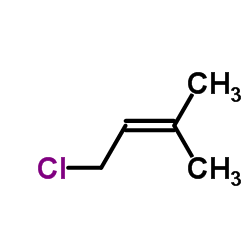
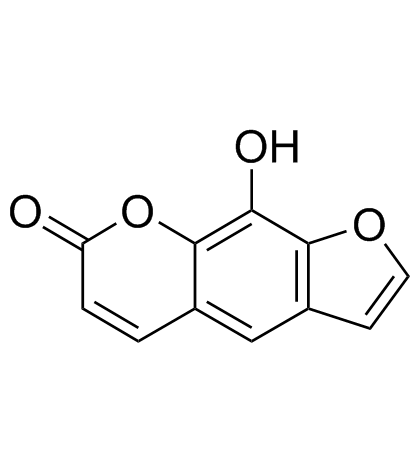
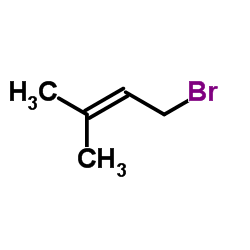

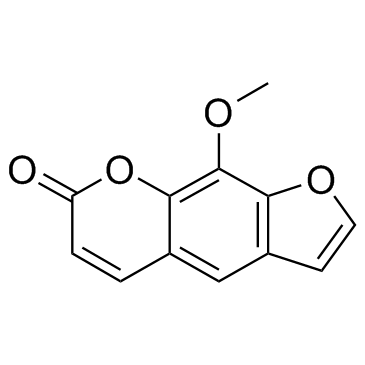
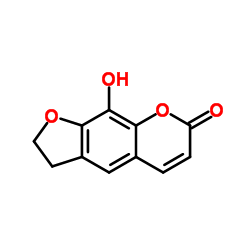
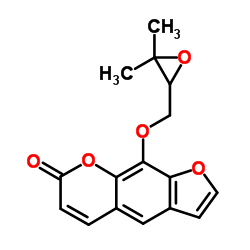
![9-(3'-Hydroperoxy-3'-methyl-1'-butenyloxy)furo[3,2-g][1]benzopyran-7-one结构式](https://image.chemsrc.com/caspic/345/135366-52-8.png)
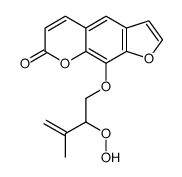
![9-hydroxy-4-prop-2-enylfuro[3,2-g]chromen-7-one结构式](https://image.chemsrc.com/caspic/384/65161-79-7.png)
